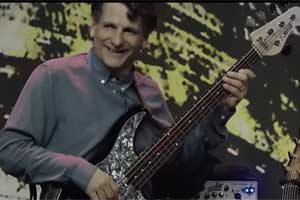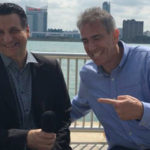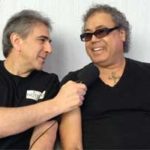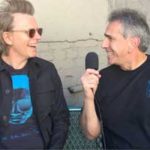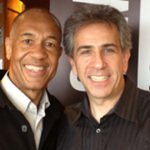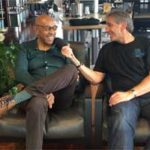Seasoned bass vet describes his latest record, “Brooklyn,” new label and forthcoming documentary
Exclusive interview with FBPO’s Jon Liebman
August 24, 2015
John Patitucci practically became a household name in the music world in the mid ‘80s when he joined Chick Corea’s Elektric and Akoustic bands. He was also one of the early pioneers of the 6-string electric bass.
In addition to his tenure with Corea, as well as his current longstanding gig with jazz legend Wayne Shorter, John has also performed and/or recorded with Stan Getz, Dizzy Gillespie, Herbie Hancock, Sting, Michael Brecker, Freddie Hubbard, B.B. King, Bonnie Raitt, Hubert Laws, Tony Williams, Carly Simon, Flora Purim and countless others.
FBPO’s Jon Liebman caught up with John by phone to discuss his latest release, Brooklyn.
FBPO: I’ve really been enjoying your new record, John.
JP: Oh, I’m so happy, man. That’s great. It was really a blast. I mean we had the greatest time making that record.
FBPO: It’s been a while since you put out a record.
JP: Six years.
FBPO: What inspired you to record this album?
JP: I have a lot of different projects that I’d like to do, but after 2009, when I did Remembrance, my record deal ended with Concord. The industry has gotten quite a bit tighter in terms of recording and I didn’t see any real good deals out there after that. I had 13 records already out and I didn’t own any of them. There are a bunch of things that I’d like to do, different projects, and there are still tons of things that I’d like to record. It’s just that, nowadays, unless you’re independently wealthy, you can’t crank out a record every year. At least I can’t! [Laughs]
So, my brother-in-law approached me about doing this documentary. I told him I didn’t think anybody’s really gonna be interested in a documentary about me. So he said, “What if we made it about the making of a recording and sprinkle in things about where you’re from, things about you.” I said that sounds good, but I still don’t know if anybody’s going to watch it. If I could make a record, though, that would be great. So I thought about it and we said, “Okay, we’ll start a record label, just for my stuff.”
FBPO: Three Faces.
JP: Yeah! We thought it would be really cool. Of course, since then, we realized how much work it is. It’s an insane amount of work! But it is it’s kind of neat to have control over the quality and make all the decisions, you know, having the decision-making totally in your hands, beyond the music. I’ve always had a lot of musical freedom, artistic freedom, because Chick Corea sort of bought that for me early on. He made sure that I had artistic and creative freedom on all my records when he helped me get a deal in, I don’t know, 1987, or something like that.
FBPO: So this new label is going to be primarily for your own stuff?
JP: Yeah, I don’t know that we’re going to be cranking out records, after all the work that went into this already [Laughs]. I think we need a break. I don’t see us having budget for other people to do records that we can find.
FBPO: Let’s talk about Brooklyn. The first tune is called “IN9-1881.” What does that mean?
JP: Oh, IN9-1881 was my phone number in Brooklyn! IN9-1881.
FBPO: [Laughing] I’ve been Googling it, trying to figure it out what it means!
JP: Yeah, “INGERSOL 9.” You know, they used to have those prefixes. I was born in ’59, so we’re talking about growing up in the ‘60s and they still had those prefixes, you know, “LUDLOW-5” or you know, “PENNSYLVANIA-5,” all that kind of stuff.
FBPO: Yes, I remember.
JP: So that’s what that is. And, right off the bat, I thought that would be a cool thing. Part of my rationale with all this was, when I grew up in Brooklyn, I was exposed to a lot of music. Of course the R&B music and soulful music and those bass players that so many of us grew up listening to: (James) Jamerson, Chuck Rainey, Willie Weeks, Jerry Jemmott. And then, of course, later, Stanley and Jaco, Anthony Jackson. I’m speaking of electric bass only. This is the first time I’ve done an exclusively electric bass record, ever, actually.
FBPO: You’ve got some funky R&B stuff, but you’ve also got a couple of Monk tunes and even some straight-ahead jazz. It works great on the electric, but is there a reason that you didn’t play any upright?
JP: Yes, because, well, I grew up in Brooklyn and that’s all I had. All I had was an electric bass to interpret all the music that was coming at me. And, when I was a kid, we were listening to R&B on the radio. Listening, of course, to the Beatles and also B.B. King and Hendrix. So we were influenced by the blues, R&B, rock music from England, pop music in America. And then my grandfather came home one day with this box of records, which were all jazz records.
FBPO: Right. I remember you telling me that story in your first interview. What a treasure trove.
JP: It was insane! I mean, the stuff that was there. There were Monk records and Wes Montgomery records and Art Blakey records – the one called Mosaic, with Wayne Shorter – and Oscar Peterson records, Jimmy Smith, all these different kinds of things that were like … What?! My brother and I were just aghast. We hadn’t even dreamed about anything like that. We had no idea. You know, we didn’t know what was going on, but we were drawn to it, especially the more bluesy stuff. It kind of drew us in because we didn’t know anything about bebop. We were just children of the ‘60s, the R&B and all the stuff that.
Also, Jon, what was so significant was growing up in East Flatbush. Not far from me, there were so many of the great jazz masters living in Brooklyn at that time. Max Roach was there. It was a real civil rights touchstone, the place. All these things were happening in the African-American classical music of America: Jazz. So, we had Freddie (Hubbard) and Joe Henderson and all these guys were living in Brooklyn. Of course I didn’t know it, but I have to think that because it was in the air all around me, it was kind of inevitable. Hence, my grandfather discovering the records and bringing them home.
FBPO: That explains a lot.
JP: And here’s the thing, Jon. When I first heard jazz and walking, all I had was my electric bass to do it on, so I was trying to get that sound like the acoustic bass players. The other huge piece of the puzzle is all my life, I always felt more comfortable walking on my acoustic bass until Yamaha made me this beautiful bass that looks like a giant L5 guitar. And this bass is incredible, man! That’s what you hear on “IN9” and “The Search” and the Monk tunes. It’s got this real dark, woody, big, thick center, but then when you go up high and blow on it, it’s kind of like Wes or it’s like that kind of mellow, thick “guitar-y” but thicker sound.
FBPO: Are “IN9-1881” and “The Search” two different tunes?
JP: “IN9-1881” goes right into “The Search.” It’s just the intro. It’s very almost classical sounding. Really, after hearing the harmony of it, the way it goes, I realized that I was so influenced. We always joke that when something is so influenced by something, that I owe somebody some money. So I think I owe Stravinsky, even more, almost Tchaikovsky, on that intro, the way those eighth-note things go between the guitars and the counterpoint. That’s kind of Russian, if you really listen to it. [Laughs]
FBPO: I love the interplay with the guitars.
JP: Yeah, but with the drums and the way the harmonies move, I would definitely say it’s heavily influenced. It’s just that it’s not so obvious because it’s electric guitars doing it, you know? If you orchestrated that for an orchestra, you would go, “Oh yeah, this guy’s ripping off some Tchaikovsky!” [Laughs]
FBPO: “JLR” feels like there’s a hint of reggae, mixed in with a B.B. King-inspired minor blues.
JP: That’s totally B.B. King! Yeah, it’s a nod to B.B. and Albert King. It’s my tribute to them. Additionally, the roots of “JLR,” that stands for “Jive Little Rulebook.” When I was on the road with Brian Blade and we would encounter those people behind the airline desk that wanted to charge us an arm and a leg, excess baggage, for the acoustic bass, I started making up this tune, “Jive Little Rulebook.” I had in my mind it would be so great if Bobby Bland sang it, or Buddy Guy [Laughs], or B.B.! You know (sings), “Jive Little Rulebook,” you can hear those guys singing that thing, totally killing it! I even made lyrics up and everything. We used to just get in hysterics and whenever we’d encounter somebody like that, our code was, “Oh yeah, it’s the JLR, man.” [Laughs]. So that’s the story.
FBPO: Didn’t Chick have a tune called “Terminal Baggage Claim”?
JP: Yes! He did.
FBPO: I always wondered what inspired that tune. I was just imagining you guys landing somewhere, waiting for your stuff…
JP: Or not getting it back! The luggage is lost and all that. So that’s the “JLR.” It’s a real blues. And “Band of Brothers” is also very influenced by the blues.
FBPO: Yeah, you’ve got a Wilson Pickett thing happening on that one.
JP: That’s kind of “Midnight Hour”-ish,” Duck Dunn. I used a different ax for that. I had this prototype Yamaha 5-string that had flatwounds, you know. We were miking the amp. We miked the amp on the whole record. I use Aguilars always, which I love, but on this record, for some of the real oldie, vintage kind of thing, like “JLR,” and “Band of Brothers,” I also used an old B15.
FBPO: With your Yamaha bass, right?
JP: Yes! With flatwound strings. It’s fantastic, this 5-string. I have two of them. And they were only marketed in Japan. They never made it to the states. Really cool. It’s kind of like, you know, for the people that love that Fender sound, but it’s not just that. I felt like I still have my own feeling and voice with it, where, sometimes, when I’m playing an old Fender, I feel like I’m sort of putting on another jacket that’s a little too big for me, as much as I love it, you know?
FBPO: I love your duo work with Brian, too, on “The Thumb.”
JP: That’s a Wes Montgomery tune and it’s one of my favorites. It’s off a record called Tequila and that was in the box of records my grandfather brought home. That tune made a huge impact on me. It was one of the biggest impacts on my early listening of jazz because it’s very bluesy and on the record was Wes, Ron Carter, Grady Tate and Ray Barretto. That’s why you hear some octaves in there too, in the melody. I was trying to play all the things in it with just bass and drums, instead of having the whole trio.
FBPO: I really love the ending, too.
JP: That was taken from Ron. Ron was doing that on the original. It fades out with Ron going “dit-dit-dit-don…” He keeps doing that thing: Bb, A, Ab, G, and he’s killing it! That made a huge impact on me and it really shaped the way I would walk, not only on the electric bass, but, later on, on the acoustic. It really, really, really, really inspired me, ‘cause it’s so hip. If you go back and listen to the original, you’ll totally get what I was going for.
FBPO: Tell me about “Bells of Coutance.” It sounds like it might be about a church.
JP: Well, it is. There was a church near the hotel I was staying at with Wayne in Coutances, France, and these church bells went off. It was very diatonic, but there were all these overtones, so I was sort of hearing clusters and everything. I recorded it on my iPhone, the church bells, and then I went back to my room and I started to orchestrate it. Originally, I wrote that for a brass choir, just as an exercise, like, how can I give people this experience that I had because these bells were really incredible, as only an old set of church bells can sound? They just sounded incredible, with all the overtones, and it was really, really something.
FBPO: So how does that fit into the “Brooklyn” theme?
JP: Well, I think that was more of a spacer between all the grooves, to air out and have some color. Brooklyn is not always looking backwards, but it’s also looking forwards. I mean it’s a different way of writing for me. Like I’ve never had a band with two guitars, so there’s some contrapuntal writing, there’s some African stuff, there’s some bebop, there’s some blues.
FBPO: “Go Down Moses” almost sounds more like a New Orleans influence, than Brooklyn.
JP: Well, totally. Now that has to do, also, with the fact that I loved soulful and bluesy church and gospel stuff. And the blues was everywhere in Brooklyn, all around me. I didn’t know all about it yet, but I heard it on the R&B records on the radio. All of that music comes out of the blues. And the church. “Go Down Moses” is also a tribute to Louis Armstrong because I heard a recording of him doing it, singing it, and I was knocked out. When I went to do that record, I had actually done that little arrangement and we did it at church once and I wondered, “What would it be like with the guitars?” It almost has a “David Lynch goes to New Orleans” vibe with the guitars, with the tremolo and the different stuff. [Laughs] And if you listen carefully, the bass solo on that definitely has a couple of things that are straight-up Louis Armstrong, actually.
FBPO: “Tesori,” your tribute to your family, is an exquisite, unaccompanied bass solo. Is there a Brooklyn connection there?
JP: Tesori means treasure in Italian. Even though I’ve lived other places in my life, those first thirteen years of my life in Brooklyn were so seminal and left such an imprint on me, which is why, eventually, I had to move back. I moved back almost twenty years ago. I don’t live in Brooklyn now, but I live in New York and I’m back home. To me, everything sort of leads back there because, in other words, that was the first place I heard anything. It was the first place I heard R&B, the first place I heard funk, the first place I heard what was funky in the ‘60s, you know, Stevie and all the Motown records. It was even before what became funk in the ‘70s. So much of the roots were put down in Brooklyn. As a kid, that’s what inspired me to play music and that’s why it sort of relates to everything that came after that.
And here’s the other thing, too, that’s an interesting reference. My brother is a guitarist and he was my first teacher. So something like “Tesori” is also a way to harmonize. Guitar was the first instrument I tried to play and, since I’m left-handed, I could never play with a pick and I never felt comfortable. His teacher was making him learn how to read music right from the get-go, so it was like those Mel Bay books and “Little Brown Jug” on the E-string. I was like 8 and I said, “This is hard,” and I had no patience.
By the time I was 10, my brother put an electric bass in my hand. But I think I always had a love for the guitar in terms of chords, you know, what they do chordally. My brother studied classical guitar later on and got a degree in it. But hearing, growing up around my brother, starting in Brooklyn, I think the first guitar he had was a Harmony “Hollywood,” which was kind of like a big, hollow body jazz guitar, believe it or not. So that was the first thing I had in my hand, as an instrument. I mean I had bongo drums and maracas and I also really wanted to play the drums, but I knew my dad wouldn’t let me do that.
FBPO: Does that explain the instrumentation you chose, with the two guitars and the drums?
JP: Well, I mean drums are pretty essential. I have a drum set now. As soon as I got old enough to have my own stuff, once I finally had a house in my life, I got a drum set. If you love to play the bass, you’re partly a drummer already ‘cause it’s in you and your best friend in the band is the drums. It’s just so incredible and essential that how could you not love the drums? Brian and I are like total brothers and he’s part of my family.
FBPO: You guys go back a long way.
JP: Now we do, yeah. He’s just extraordinary and there’s nobody like him.
FBPO: How about the other guys, Adam (Cardenas) and Steve (Rogers)?
JP: Adam’s amazing and so is Steve. This is the thing: Steve I knew (each other) in LA and he was always a great guitarist and I loved the way he played. Then, when I came to New York, we played a little bit and he sounded great. He’s played in my band before. And Adam Rogers, I actually I met him when I was on the road with my band, in the ‘90s. I heard him playing with Bill Evans’ band and he was just roaring on the guitar.
FBPO: Bill Evans, the sax player, right?
JP: Yeah, yeah. And Adam was just killing it. Then I got to know him and realized that he could play literally anything. He got his degree in classical guitar, even subbed at the Metropolitan Opera when he was in college. He can play literally any kind of guitar. He’s a screaming bebop changes player. As you hear on “JLR,” he can play like a real blues guy and he really has that on the Telly. He’s a great rhythm guitar player. He can literally play any style of guitar.
Steve is an amazing guitarist too. And he can play rhythm guitar and he’s a great jazz musician. He did a lot of the transcriptions for that Thelonious Monk book that Hal Leonard put out.
FBPO: That’s right. I read about that.
JP: Yeah, so he’s brilliant. But the thing that knocked me out is the way they comp for each other and the way they just play together. They haven’t really played together that much over the years. So that was something that turned out even better than I thought it would, which was exciting. The bond they created and the way they played and how sensitive they are with each other is pretty extraordinary. You don’t hear two guitar players playing that in sync all the time.
FBPO: It’s an interesting instrumentation you chose. Very easy on the ears.
JP: I’m glad you like it. I think, in an interesting way, I listen to people who write to me over the years and there were a lot of people that kept saying, “Oh man, when are you going to do an electric project? We love you when you play with Chick.” You know, I’ve done a lot with the acoustic bass for quite a long time now. I never stopped playing the electric, but sometimes I guess people they thought I had or something. I haven’t stopped. In fact, I’m still trying to grow on it and get better.
FBPO: All the studio sessions for this record were filmed?
JP: Yeah, for the documentary. In fact, we’re going to open at the Iridium in New York City and they’re going to film one night there too. They’ve been working on this documentary and they’re almost done with the shooting. They’re doing a lot of editing now, but we are going to film a little bit more.
FBPO: So what’s next for you, John? What else can we look forward to seeing and hearing from you?
JP: Well, you know, Danilo Perez, Brian Blade and I have a trio called Children of the Light and we went into the studio last spring and made a record. It’s probably going to come out later in the year. And we’ll be doing some more stuff with Wayne, as well. And I’m always doing different projects, doing record dates for people, still playing on films. I did an interesting film with Carter Burwell that’s coming out.
FBPO: What about an acoustic project? Isn’t that an obvious follow-up?
JP: Well, you know, I have all kinds of things I’d like to do. There’s a gospel record I’d like to do, with singers and everything. There’s always acoustic stuff. I’d like to do chamber music project, too, because I’m always writing stuff like that too.
FBPO: What would you be if you weren’t a bass player?
JP: Well, you know, my brother’s a pastor and I’m very involved in community stuff and social justice issues and trying to serve. That’s something very close to my heart. My brother’s heart is (in) helping people who just didn’t have the chances that we had. My father grew up poor. We grew up kind of middle class and not having a lot of stuff. I’ve been around the world a lot and I’ve seen some serious poverty. Danilo Perez has that foundation for the kids in Panama and I love that stuff. I’m an elder in my church and I’m quite involved in all that too. So I probably would have been involved, somehow, in that zone. I’m still trying to do it anyway. That’s something that I love, actually.
FBPO: That’s very inspiring. I’m glad I asked.
JP: I also love sports, but I was never good enough at a lot of them. I was pretty good at football, believe it or not. I was a halfback. I was pretty quick. I had some moves, but I wasn’t very big [Laughs]. My Dad never allowed me to play in a league or anything. I was just playing street ball.
FBPO: Anything else you’d like to add, John?
JP: No, I’m so thankful that you wanted to do this. I think your site is a wonderful thing for bass players. It’s another chance for the community to hear what’s going on.
